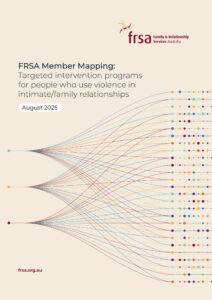 When policymakers talk about programs for people who use violence in their relationships, the question is often the same: did they complete it? On paper, completion seems like a tidy measure. But for families living with violence, it misses what matters most.
When policymakers talk about programs for people who use violence in their relationships, the question is often the same: did they complete it? On paper, completion seems like a tidy measure. But for families living with violence, it misses what matters most.
The FRSA Member Mapping report points to the true impact of the programs run by our Members. Each year, almost 6,000 people who use violence engage with programs delivered by Members. These are not just individuals. They are parents, partners and family members. Every time they engage, there is an opportunity to support the people around them.
Our report found that most programs are group-based, but some also provide case management and individual support. This flexibility matters because group work does not suit everyone. People facing housing stress, mental health challenges or substance use may need more tailored approaches. Providers know this, and they adapt where they can.
Importantly, about 80 percent of programs offer some support for partners, ex-partners or children. That support can be the difference between a family struggling in silence and a family being connected to counselling, housing or safety planning. Yet too often, this work is not consistent, measured or resourced. Outcomes are still largely judged on whether a person using violence completes the program (or even just starts it), not whether their family is safer.
If policy is serious about ending family violence, this has to change. Funding must recognise the value of all engagement, not just completion. Program supports for families need to be built in as standard, not added on as extras. Programs must be deliberately linked with housing, health, justice and child and family services. And evaluation must capture impacts on families, not just on the person using violence.
FRSA members are already delivering this work every day. They have the trust of their communities and the skills to work across whole-of-family needs. With the right policy and funding settings, intervention programs can become a powerful lever for reducing violence and building safer families. It is time to expand our view of success to include what families need most: safety, stability and support.





